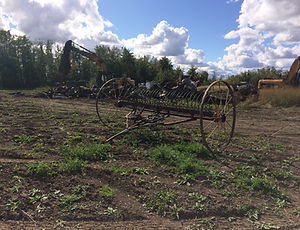
Go-to Scrap Metal Recycling in Grande Prairie
Looking for trusted scrap metal recycling in Grande Prairie, Beaverlodge and the surrounding Peace Country? Count on Radius Metal! With over a year of experience since taking over the scrap yard from a previously tarnished company, we want you to know that we're a different company. At Radius Metal, we pride ourselves on our specialized expertise in site cleanup, honed over 12 years of dedicated service to our customers. As your one-stop service provider, we handle everything from demolition to site cleanup. Plus, we offer a unique service – we'll take your scrap and pay you for it! Whether you're a homeowner, farmer, mechanic, or part of the oil field industry, we're here to assist you.
We're actively seeking oil field scrap and expanding our services to include selling parts and equipment. Trust Radius Metal for all your salvage and demolition needs—we're committed to excellence from start to finish. Call or visit for more information.
What We Buy
These are the products we accept. You can sell us:

Shred
-
Appliances
-
Autos
-
Tin/light metal

Oversized
-
Farm equipment
-
Steel structures
-
Pipe
-
Fabrication scraps
-
Structural I-beam and tubing

Non-ferrous
-
Copper
-
Aluminum
-
Lead
-
Brass
-
Wire-stripped and insulated
-
Stainless steel
What Happens During A Scrap Metal Recycling Process?
The process of scrap metal recycling and transforming involves a lot of steps, including—
-
Gathering—It starts with gathering scrap metal from various places, such as construction sites and industrial areas. The waste includes old appliances, scrapped vehicles, and waste goods. These tasks are usually carried out by scrapyards, individuals, and others providing this service.
-
Sorting—After collecting the material, it is divided and categorized according to its type and quality. The metals are separated using a large magnate. Sometimes, sorting also includes some valuables and stainless steel materials.
-
Processing—Now, these sorted metals are prepared for the melting process. They are shredded into smaller pieces to a specific size suitable for the melting process.
-
Melting—The process of melting starts by putting the metals into the furnace. The type of furnace used usually depends on the type of metals used. During melting, contaminants such as paint, insulation, or coatings are burned off or removed through chemical processes.
-
Purification—After the metals are properly melted, the impurities are removed to achieve the perfect form. Refining methods like electrolysis, degassing, and fluxing remove impurities.
-
Solidification—When the impurities are removed and the composition looks perfect, metals are cast into the moulds to cool down, take shape, and solidify. When they are completely ready, they are used as raw materials for processing new products.
-
Transportation and sale—The recycled metal ingots are transported to manufacturers who use them to produce new products, such as automobiles, appliances, construction materials, or industrial equipment. Alternatively, the ingots may be sold to metal traders or brokers.


Type of Scrap Metal
There are two significant types of scrap metal: ferrous and non-ferrous.
-
Ferrous metals—These are the most significant types of scrap metal that contain iron. Ferrous metals are usually required in construction and manufacturing as they are durable, strong, and magnetic. Some of the most common examples of scrap metals are iron, steel, and cast iron.
-
Non-ferrous metals—Non-ferrous metals don’t include iron and are generally lighter in weight than ferrous metals. They are highly corrosion and rust-resistant without having magnetic properties. The most common examples are nickel, brass, copper, aluminum, and lead.
-
Other types—Other types of metal include exotic and precious metals. Precious metals are highly durable due to their unique properties, while exotic metals are used in technical industries.




